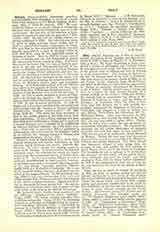

Billy, (BILLI) JACQUES DE, a French patristic scholar, theologian, jurist, linguist, and Benedictine abbot, b. 1535 at Guise in Picardy; d. December 25, 1581 at Paris. He began his studies at Paris, completed a course of philosophy and theology before he was eighteen years of age, and then, at the request of his parents went to Orleans and later to Poitiers to study jurisprudence. But having no inclination for law, he devoted most of his time to literature. The early death of his parents (Louis de Billy, of an old French family originally from Ile-de-France, and Marie de Brichanteau) gave him the opportunity he desired of pursuing unhampered his favorite study of letters. Quietly withdrawing to Lyons and later to Avignon, de Billy devoted himself, for a period, entirely to the study of Greek and Hebrew. He already held in commendam the Abbey of St.-Leonard of Ferricres in Anjou, and the Priory of Taussigny in Tourraine, when his older brother Jean, who had hitherto led a very worldly life, suddenly announced his intention of becoming a Carthusian, and resigned in favor of Jacques his two abbeys, Notre-Dame des Chatelliers and St.-Michel-en-l’Herme. After some hesitation de Billy accepted them, then entered the Order of St. Benedict, and later was made a regular abbot. Thenceforth he led a very ascetic life and governed his monasteries with great prudence. He was especially solicitous for the proper observance of monastic discipline and with that object in view renewed, in 1566, the statutes of his predecessor, Abbot Bertrand de Moussy. During the civil wars that devastated France at this period the monastery of St.-Michel-en-l’Herme was wholly destroyed. The abbot himself was frequently obliged to seek refuge from the ravages of war, and resided, for short periods, at Laon, Nantes, Paris, and in the Priory of Taussigny. The hardships he had to undergo in his journeyings, his incessant toil and study, and his ascetic observances gradually shattered his health, and while staying in Paris with his friend Gilbert Genebrard, he died at the comparatively early age of forty-six. He was buried in the choir of the church of Saint-Severin.
From the day on which he entered the novitiate, de Billy set aside all profane studies and devoted himself exclusively to the study of the Fathers. His critical abilities and exceptional linguistic attainments (he wrote Greek and Latin with singular purity and precision) enabled him to do much for the emendation of the text and the correct interpretation of many obscure passages in the Church Fathers. His favorite among the Fathers was St. Gregory Nazianzen. His principal works are: (I) “S. Gregorii Nazianzeni opera omnia latine” (Paris, 1569); a second and better edition appeared in 1583. (2) “Consolations et instructions” (Paris. 1570). (3) “Recreations spirituelles” (Paris, 1573). (4) “S. Gregorii Nazianzeni opuseula” (Paris, 1575). (5) “Interpretatio Latina xviii priorum capituin S. Irensei” (Paris, 1575). (6) “Anthologia sacra” (Paris, 1576). (7) “Joannis Damasceni opera” (Paris, 1577). (8) “Locutiones Graeae” (Paris, 1578). (9) “Opuscula aliqua S. Joannis Chrysostomi” (Paris, 1581). (10) “S. Isidori Pelusiotae epis. libri tres” (Paris, 1585). (11) “S. Epiphanii opera” (Paris, 1612).
THOMAS OESTREICH.

